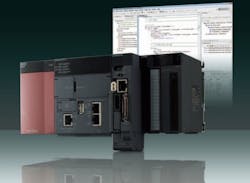Just as I was preparing to post an article on Airbus’s use of Internet of Things-related technologies in its Factory of the Future project, I received notice of another Internet of Things application. In this case, the implementation took place at one of Intel’s manufacturing facilities in Malaysia.
This project at Intel’s plant is part of a collaborative agreement between Intel Corp. and Mitsubishi Electric Corp. to develop “next-generation factory automation systems with Internet of Things (IoT) technologies.” The project is unfolding through a pilot program at Intel’s backend manufacturing facility in Malaysia. The focus of this pilot is to demonstrate the benefits of the IoT in a factory setting through a combination of Intel’s experience developing solutions for IoT and Mitsubishi Electric’s e-F@ctory automation products.
A key piece of technology used in this project is the C Controller IoT gateway from Mitsubishi Electric’s iQ-Platform, which uses an Intel Atom processor. Using the C Controller, Intel reports that it was able to securely gather and aggregate data for its analytics server which was processed using Revolution R Enterprise software from Revolution Analytics. This analytics software uses the open source R statistics language, hosted on Cloudera Enterprise, which served as the foundation for the project’s enterprise data hub.
An initial assessment of the project shows that implementation of the IoT technology and ensuing analysis improved equipment component uptime, increased yield and productivity by minimizing misclassification of good units as bad, enabled predictive maintenance, and reduced component failures. In total, Intel says the facility realized initial savings of U.S. $9 million through cost avoidance and improved decision-making.
“The collaboration between Mitsubishi Electric and Intel on this IoT project has enabled field data from semiconductor manufacturing lines to be collected and analyzed to improve operational performance, yet also contribute energy savings,” said Masayuki Yamamoto, group senior vice president, Factory Automation Systems, Mitsubishi Electric Corporation. “We believe that other manufacturers can benefit from this joint Intel-Mitsubishi Electric solution, which combines big data analysis, optimized data capture and processing to deliver improved performance and optimized maintenance.”
Judging by the increasing speed with which real world IoT applications in manufacturing are being reported, it’s clear that the concept has legs. What remains to be seen is how quickly mid-sized manufacturers pick up on the trend. The big question is: Will mid-sized manufacturers get involved in IoT applications on their own, or will they be driven there through value chain requirements from the bigger manufacturers they supply?
Leaders relevant to this article:


